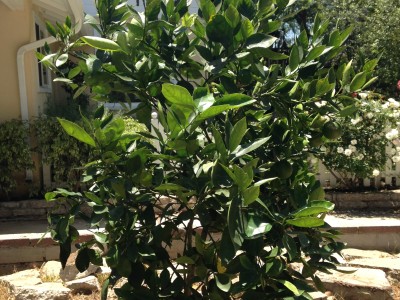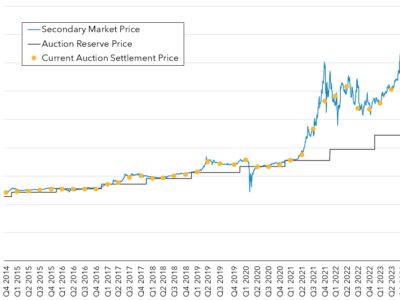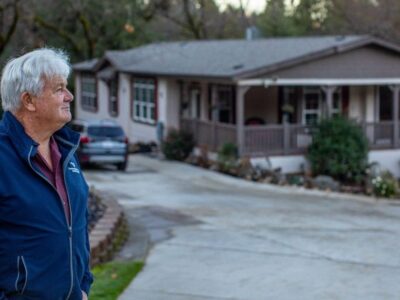Immanuel Kant and the California Water Crisis
How Should Individuals Decide How Much Water to Use?

Last week’s rain in southern California will hardly make a dent in the state’s devastating drought, and it raises an important question for individual consumers: exactly how should we decide how much water to use? There are obvious things: don’t hose down your driveway, take shorter showers, do full loads in the washer. But there are a lot of other decisions to make, and it isn’t clear to me how to go about choosing.
So consider this as an example:
As my wife never hesitates to remind me, I’m not much of a homebody. I like getting out. But in an effort to do more home-related things, last June, I bought an orange tree seedling; I would develop my inner gardener, I thought. I named the tree “Jaffa.” And so for the past few months I have done my best to take care of it.
But there is one big problem: despite what you might think, orange trees are not native to California, and they are anything but drought-tolerant. They need water. Indeed, the early development of California irrigation stemmed from the demands of farmers who realized that oranges would grow beautifully in the state if they got enough water.
So should I keep watering Jaffa? That’s where Immanuel Kant comes in.

Kant, of course, is famous for his “categorical imperative,” a moral principle that universalizes individual action. When confronted with a moral challenge, Kant suggested that you ask: what if everyone did this? “Every rational being,” Kant argued, “must so act as if he were through his maxim always a legislating member in the universal kingdom of ends.”
Back to Jaffa. Let’s see: I never water my lawn — or more accurately, what’s left of my lawn (it’s mostly weeds now — one of these days, I will put in fancy-schmancy desert landscaping). Don’t water in the backyard, either, except for native plants that my wife put in. So what if everyone in California didn’t water their lawns, or tore them out, and replaced them with drought-tolerant landscapes but also had an orange tree? Or maybe even two orange trees? That would be great!
I think, then, that the proper approach is to 1) avoid using water where it is obviously wasteful, e.g. long showers, hosing down the driveway; and then 2) consider overall water use. If I am using a certain amount of water, but if every urban user did the same, California would be in far better shape, then it’s okay.
So I’m happy to keep watering Jaffa. She’s beginning to produce some nice fruit. And I don’t feel guilty about that at all.
Reader Comments
8 Replies to “Immanuel Kant and the California Water Crisis”
Comments are closed.








Jonathan: First, let me tell you that I was the Chief Counsel for the State Water Resources Control Board from 1974-2000. I was part of the 77 and 88 drought effort. You have my permission (for what its worth) to use grey water to hand water your tree. Your other efforts at saving water will certainly offset what water you use on the tree. More importantly I see that you wrote the Mono Lake article. I was present for all of the Mono court hearings and then some. There are some interesting back stories to the whole affair. Bill@h2O
Hi Bill — Thank you! So, two things: 1) what’s the best way to get a good grey water system? Does shower water with shampoo in it count? and 2) how do I contact you re Mono Lake?
Jonathan: my wife has developed a procedure of filling up a bucket with cold water when the shower is turned and then we use the bucket water for our potted plants. Water with shampoo, especially baby type shampoo should not hurt your plants. The experts on grey water are the Marin Municipal Water Dist. people. During the 88 drought Marin county residents were the experts in using every last drop. We fill up plastic milk containers with cold water before we wash the dishes. Last year we got rid of the front lawn and put in drought tolerant plants with a drip system. Re Mono Lake when the MOFO attorney presented his arguments to the 3rd DCA he had to pause and give his son some change to go plug the meter in front of the court house. Who does stuff like that? You can reach me at [email protected] or 916-434-5680.I live in Lincoln CA. which is about 40 minutes north of Sacramento. Bill
Jonathan, I accept the fact that UC professors and scholars who post on Legal Planet are dedicated to protecting long-term future quality of life for our newest and future generations, but I wonder why other professors and scholars in other disciplines at UC do not join with you in order to achieve the same goal as a categorical imperative?
I think that lots of them do. They just don’t blog about it! That’s my own scholarly tick….
Thank you again Jonathan, as you and your Legal Planet colleagues document, we are losing the battle (failing water supplies, rapidly melting glaciers, increasing drought and environmental failures, out of control flooding, deadly heat waves and cyclones) by not joining far more UC professors and scholars together in a multidisciplinary way to make the right things happen much faster.
We must find a better way to “Adapt in Time” http://alumni.berkeley.edu/california-magazine/september-october-2006-global-warning/can-we-adapt-time
Jonathan, can’t get Kant out of my mind. One of the grimmest realities of humanity that bothers me the most is that before the Nazis took over, Germany had many of the greatest philosophers, composers and academics in the world, but that didn’t stop the Nazi mentality from dominating the German culture.
How long shall we continue to act like chimpanzees before we really evolve to the full capability of our brains, or is it too late already because our scientific advancements are no longer within our control to protect our long-term future from climate changes that are already out of our control?
The last line of The Education of Henry Adams might answer your question: “Man has mounted science, and now has been run away with….”